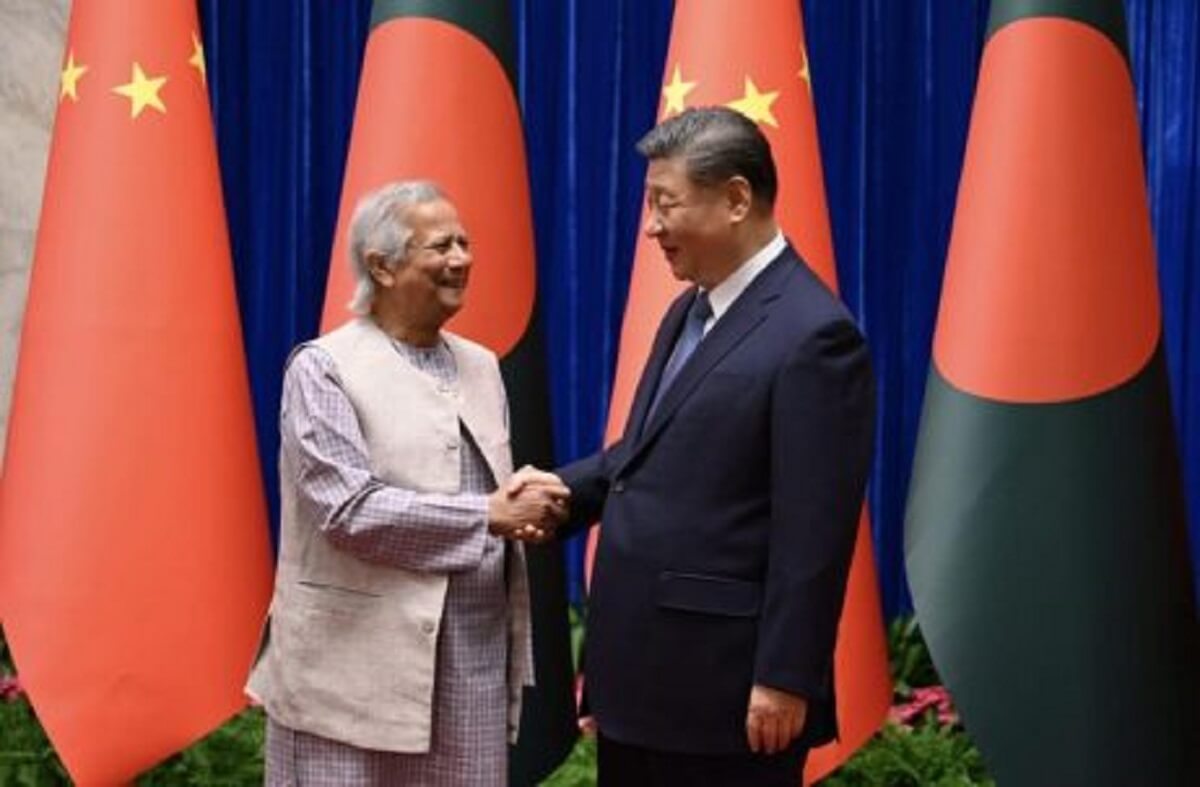Bangladesh’s Post-Hasina Foreign Policy Reset
The country’s foreign policy has changed a great deal in the year since Sheikh Hasina’s exit.
Saqlain Rizve | 04 August 2025
Following Sheikh Hasina’s exit from power in August 2024, Bangladesh began reshaping its foreign policy, gradually moving away from its India-centric posture and pursuing a more diversified diplomatic approach. The interim government has sought to deepen engagement with China, Pakistan, and Western powers such as the United States and the European Union. India, long considered a supporter of Hasina’s regime, now faces criticism from Bangladeshis who accuse it of meddling.
A major milestone came during Chief Adviser Muhammad Yunus’ visit to China in March 2025. The trip underscored Beijing’s emergence as a key economic partner. Bangladesh secured $2.1 billion in loans, investments, and grants, including $400 million for the modernization of Mongla Port and $350 million for the Chinese Industrial Economic Zone in Chattogram. Eight MoUs were signed, covering areas such as infrastructure, healthcare, manufacturing, and hydrological data sharing related to the YarlungTsangpo-Yamuna River. Notably, China’s renewed interest in the Teesta River project – long stalled due to tensions with India – illustrates Dhaka’s strategic pivot toward Beijing as a counterweight to Indian influence.
Other outcomes included an extension of duty-free access for 99 percent of Bangladeshi exports until 2028, discussions to reduce interest rates on Chinese loans, and talks on setting up Chinese factories in textiles, pharmaceuticals, and renewable energy. Moreover, the U.S. Defense Intelligence Agency recently warned that China is considering establishing a military presence in several countries, including Bangladesh, Pakistan, and Myanmar. However, Chinese Ambassador to Bangladesh Yao Wen has dismissed the report, denying that China has any such intentions regarding Bangladesh.
The potential launch of a direct Chittagong-Kunming flight and a boost in cultural exchanges further solidified this evolving partnership. China also reiterated support for Bangladesh on the Rohingya issue, aligning with Dhaka’s push for international cooperation.
China has also engaged with Bangladesh’s political actors. In June and July 2025, both the BNP and JI sent delegations to China at the invitation of the Chinese Communist Party. The BNP team, led by Secretary General Mirza Fakhrul Islam Alamgir, held high-level meetings with CCP Politburo member Li Hongzhong, who extended an invitation to the BNP’s acting chairman, Tarique Rahman. Around the same time, a high level JI delegation focused on party-to-party governance exchanges and future development projects. These visits reflect Beijing’s effort to build ties across Bangladesh’s political spectrum as the BNP and JI gain momentum in the post-Hasina landscape.
At the same time, Bangladesh has rekindled relations with Pakistan, which were strained under Hasina due to historical baggage from the 1971 Liberation War. Since August 2024, bilateral trade has grown, with new cooperation in construction, food, pharmaceuticals, and IT. The formation of a joint business council and Pakistan’s offer of 300 fully funded scholarships signal growing warmth. Defense ties have also progressed, with January 2025 talks on joint exercises and potential procurement of JF-17 Thunder jets as part of Bangladesh’s Forces Goal 2030 modernization plan.
In a further sign of shifting regional dynamics, a trilateral meeting took place in Kunming in June, involving representatives from China, Pakistan, and Bangladesh. Although Dhaka declined to join any alliance, the timing suggests growing coordination. These developments point to Beijing’s broader ambition to reshape the strategic landscape in South Asia through Pakistan and Bangladesh, leveraging its economic and political clout to challenge India’s traditional dominance.
This recent activity of China’s strategic presence has not gone unnoticed in New Delhi. Yunus’ earlier remarks in China, describing Bangladesh as a gateway to India’s Northeast and an extension of China’s economy, have only amplified Indian anxieties. In Bangladesh, the perception that India supported Hasina’s regime has deepened public mistrust. Bangladesh’s relations with India have thus sharply deteriorated.
Tensions were exacerbated by Dhaka’s demand for Hasina’s extradition. The interim government wants her returned to Bangladesh to face charges related to corruption and human rights abuses during her tenure. India’s reluctance to comply, citing legal and diplomatic complexities, has fueled accusations in Bangladesh that it is shielding a discredited leader. This standoff has deepened anti-India sentiment, with many Bangladeshis viewing New Delhi’s stance as evidence of continued interference in their country’s affairs.
Efforts to stabilize bilateral ties have been hampered by mutual distrust and competing narratives. India has expressed unease over Bangladesh’s warming relations with China and Pakistan, particularly the trilateral Kunming meeting, which New Delhi may perceive as a deliberate attempt to counterbalance its influence. In response, India has doubled down on its narrative of protecting minority rights in Bangladesh, particularly for Hindus, which Dhaka dismisses as a pretext for meddling. Critics in Bangladesh, however, view India’s focus on minority rights as hypocritical, given its own internal record.
The attack on Bangladesh’s diplomatic compound in Agartala in December last year, where protesters from Indian far-right organizations burned the national flag of Bangladesh, served as a warning signal for the trajectory of relations. The attack triggered outrage in Dhaka. Bangladesh’s Foreign Ministry condemned the Agartala attack as a breach of the Vienna Convention, signaling a more assertive diplomatic posture.
The interim government’s push for accountability regarding Hasina’s regime, coupled with India’s strategic imperative to maintain a foothold in Bangladesh, suggests that relations will remain turbulent unless a framework can address the extradition issue and broader geopolitical concerns.
Bangladesh’s foreign policy has clearly changed in the year since Hasina’s exit. The country is moving away from its heavy reliance on India and building stronger ties with China, Pakistan, and Western nations. As Bangladesh becomes more confident on the global stage, relations with India have become tense. Unless both sides find a common ground this mistrust is likely to continue.
Saqlain Rizve is a Bangladeshi journalist and photographer who covers politics and society from Dhaka for The Diplomat.
This article was originally published on The Diplomat.
Views in this article are author’s own and do not necessarily reflect CGS policy.
